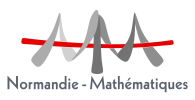TBA
TBA
TBA
TBA
Le séminaire parle d’une méthodologie pour construire des masquages invisibles dans le cadre de la tomographie par impédance électrique. Les masquages invisibles approchés théoriques nécessitent que les matériaux constitutifs soient très anisotrope. Le design proposé ici est réalisée en stratifiant trois ou plusieurs matériaux isotropes distincts et homogènes dans un nombre fini de couches. La structure est un stratifié radial et peut être construite par fabrication additive.
Cette présentation se concentre sur la modélisation et l'analyse de séries temporelles des données à structures latentes à l'aide de modèles de Markov cachés dérivants (Hidden Drifting Markov Models (HDMMs)). Nous commençons par un aperçu théorique des HDMMs, en soulignant leurs composants clés et leurs hypothèses probabilistes. Nous détaillons ensuite deux méthodes d'inférence de base : l'algorithme EM (Expectation-Maximization) pour l'estimation des paramètres et l'algorithme de Viterbi pour le décodage de la séquence la plus probable d'états cachés.
Flots de gradient dans l'espace euclidien, les espaces métriques ou les espaces de Wasserstein
Cet exposé de colloquium sera une introduction au sujet des flots de gradient, une classe d'équations d'évolution d'origine variationnelle (c'est-à-dire, liées à des problèmes d'optimisation). Je présenterai d'abord le cas le plus simple, celui des courbes dans l'espace euclidien R^n, pour montrer ensuite comment créer une théorie dans le cadre des espaces métriques, où la difficulté réside surtout dans la notion de solution, puisque ni la dérivée d'une courbe, ni le gradient d'une fonction ont un sens dans un cadre si général.
Résumé à venir
Dans ce travail, nous étudions un modèle de régression visant à décrire le comportement des valeurs extrêmes d’une variable Y à partir de covariables X. Nous proposons une méthode de réduction de dimension spécialement conçue pour les queues de distribution, permettant de surmonter le fléau de la grande dimension et d’améliorer l’estimation de l’indice des valeurs extrêmes conditionnel.
TBA
Le schéma JKO (pour Jordan, Kinderlehrer, Otto, 1996) est un schéma de
type Euler implicite permettant de construire de façon variationnelle
des solutions faibles d'équations de diffusion non-linéaire en
s'appuyant sur leur structure de flot de gradient dans l'espace de
Wasserstein. En 2015, Peyré en a proposé une version nommée entropique
qui, bien que ne fournissant que des solutions approchées du problème
originel, donne lieu à des calculs numériques redoutablement efficaces,
 Le LMRS est l'une des composantes
Le LMRS est l'une des composantes
de la Fédération Normandie-Mathématiques.
© 2026, Laboratoire de Mathématiques Raphaël Salem
